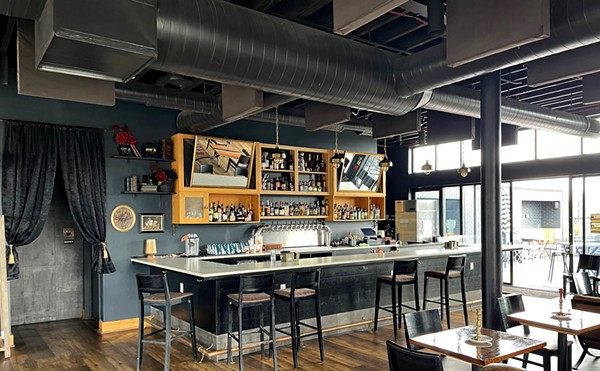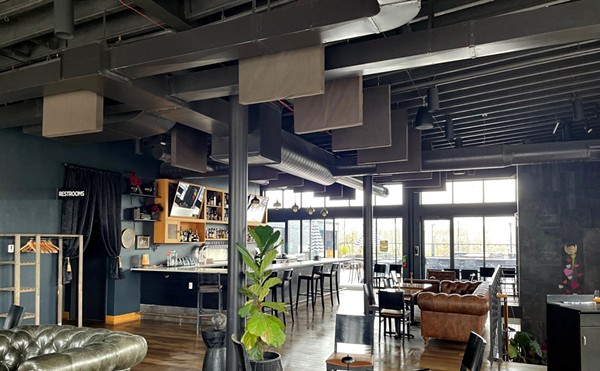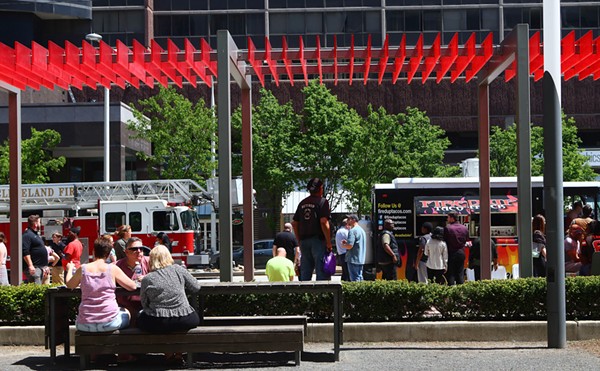We're like morticians," Tony Anselmo says of the fresh produce game. "The farmers kill the stuff in California, we drag it across the country, put a little spit shine on it, and pray that it makes it to the plate."
If you don't know the Anselmo name, perhaps you've seen his trucks. Bearing the Premier Produce logo, a fleet of a dozen or so rigs make daily visits to the back doors of Northeast Ohio's best restaurants.
One of those back doors belongs to Fahrenheit, Rocco Whalen's 10-year-old Tremont bistro. Whalen says that he's been a loyal customer for years — long before he was the star chef that he is today. "Hey, I was young when I got started," says Whalen. "Tony has helped me all along the way. Over those 15 years, we have developed a friendship and a relationship."
As proof of what sets Premier Produce apart, Whalen tells this story:
"When we lost power during the blackout of 2003, Tony's first stop was Fahrenheit, where his employees moved everything out of our coolers and into his [refrigerated] truck. Second stop: Lola [now Lolita]. Third stop: Fat Cats.... They ran their trucks all night and probably saved each of us $10,000 to $15,000 in loss."
It's service like that that helped Anselmo, along with partner Anthony Rossi, grow a makeshift produce-delivery service into a multi-million-dollar company with 40 employees.
Anselmo comes from a long line of produce peddlers. Fresh from Sicily, his grandfather made a living selling veggies door to door. For decades, Tony's father ran a bustling fruit and vegetable stand at the West Side Market called Nate Anselmo & Family. It was there, manning the scales as a fresh-faced seven-year-old, that Tony learned the meaning of quality.
"Back then, the food terminal was thriving," Anselmo says of the Northern Ohio Food Terminal, the wholesale market on Orange Avenue that supplies every restaurant, market, and grocery store with fresh produce. Everybody from small produce stand operators like Nate Anselmo on up to owners of multi-unit grocery stores like Fazio's had to buy their produce there. To get the best selection, buyers would arrive well before the doors opened at 4 a.m. Inside, it was an all-out battle for the ripest strawberries, the crispest green beans, the sweetest corn.
"People would get in fist fights over parking spaces. My dad got his jaw busted in a fight there."
But the produce game has changed, explains Anselmo, a bear of a guy who looks as if he got separated from his Hells Angels pals. Giant Eagle bought out all the independent grocers, gutting a large chunk of the terminal's business. At the same time, the dining scene in Cleveland was drastically improving.
By 1998 — around the time that Anselmo and Rossi launched Premier — chefs like Michael Symon, Karen Small, Paul Minnillo, and Doug Katz were starting to demand more unusual products: things like pineapple sage, truffle flour, and Buddha's hand citrus that national broadliners like Sysco and U.S. Foods didn't — wouldn't — stock.
"They were always adapting to what's new," says Whalen. "Their reps go to the Fancy Foods shows and bring back products that weren't already in chefs' hands." And unlike the bigs, he adds, Premier doesn't force restaurants to buy more product than they need. "With Tony, there's no minimum order. That really helps the smaller operator."
These days, instead of hitting the food terminal before dawn, Anselmo and his team deal directly with farms in California, Florida, Ohio, and elsewhere. They fill entire refrigerated "reefer" trucks with produce from numerous farms and orchards, which then travel non-stop to Cleveland with the help of multiple drivers. Shipments also are picked up at Cleveland Hopkins Airport every day.
Premier carries roughly 3,500 different products, which it sells to 300 or so assorted restaurants, hotels, catering companies, country clubs, schools, and sports venues. Among those items, roughly 75 percent are perishable fruits, vegetables, and herbs. The rest are specialty products: anything from nori wrappers for sushi to Prosciutto di Parma.
"Anthony and I knew that the only way we could grow our business was either to sell more produce or add more products," says Anselmo. "Folks like Symon and Rocco would say to us, 'Hey, can you carry milk, sour cream, butter, sriracha ...?' It was all customer driven."
Recently, Premier moved its operations from a dingy 9,000-square-foot shop on Woodland to a 45,000-square-foot, state-of-the-art warehouse. The move not only gave the company plenty of room to grow; it facilitated the transition to stringent new food safety and traceability standards.
"They're changing the rules of the game," says Anselmo. "It's like raising the hoop in the NBA."
From field to fork, best practices are being strengthened to ensure not only maximum quality, flavor, and nutrition — but also safety. Produce is under constant refrigeration from the moment it leaves the farm until the time it is unloaded at the restaurant. A small digital device, slipped into a random veggie box by the farmer, constantly records the temperature during transport. If the driver killed the A/C for 15 minutes in Nevada, the guys in Cleveland will know about it.
Traceability is paramount too: If a tainted cantaloupe makes its way onto a diner's plate, the seller needs to be able to trace it back to its source immediately.
"People are fucking dying!" Anselmo says. "It's no joke."
Not 10 minutes later, Anselmo receives a text from chef Jonathon Sawyer of Greenhouse Tavern. "He wants to know what farm and brand of jalapeños we sold him," he reads aloud in his gravelly voice. Turns out, the FDA had just issued a recall of some fresh jalapeño peppers that had tested positive for salmonella. Within seconds, Anselmo verified the producer as being not the one on the recall list.
Sawyer appreciates the service.
"They always get back with you immediately," says the chef-owner of Greenhouse Tavern and Noodlecat. "The biggest thing is the personal experience that you get with Premier."
As for the ordering process, clients have until 6 p.m. to put in their requests. The days of chefs calling drunk in the middle of the night are (mostly) in the past, Anselmo says. By 9 p.m., all the orders have been entered into the system by sales reps, and tickets are printed out for each customer. Working off these "pick tickets," night workers grab a power jack and palette and begin building each order. As they grab two-pound boxes of arugula and three-pound crates of oyster mushrooms, the workers check the product for freshness.
Routing software has already determined the order in which the pallets will be loaded onto the rigs — with the last stop going in first. Pallets are double-checked by another staffer before getting shrink-wrapped and loaded on the truck. They roll out of the dock first thing in the morning, with the goal of hitting every client between 8 and 10 a.m. — Anselmo's "sweet spot."
Images of obsessive chefs poring over boxes of produce before acceptance are slightly off the mark, says Anselmo. His clients have faith that he and his team have already weeded out the misfits. In fact, Anselmo's crew is often trusted to load the produce into the restaurant's walk-in coolers themselves.
But that doesn't mean everybody is happy all the time.
"Just yesterday Lola sent back a shipment of fucking cipollini onions because they were too big," Anselmo moans. "Really? What am I, God?"
Of course, Premier took the onions back — because that's how they stay in business, and because Anselmo's relationship with Symon goes clear back to the family produce stand at the West Side Market, where the rising-star chef shopped during his Caxton Café days.
And the special requests keep coming. Steve Schimoler needs a bag of Bibb dropped off at Crop moments before dinner service? Sure thing. The guys from Melt are in the area — can they swing by and grab a crate of lemons? You bet. A 50-pound box of spuds is too big for my restaurant. Can you split it? Love to.
"We have to be so customer-driven," Anselmo says. "We aren't the cheapest. We're like the Ferrari of vendors: custom-built with form-fitting seats. When chefs say they can get stuff cheaper elsewhere, I say, 'You want to cut corners? How about buying cheaper toilet paper?'
"In the end, they always come back to church."









